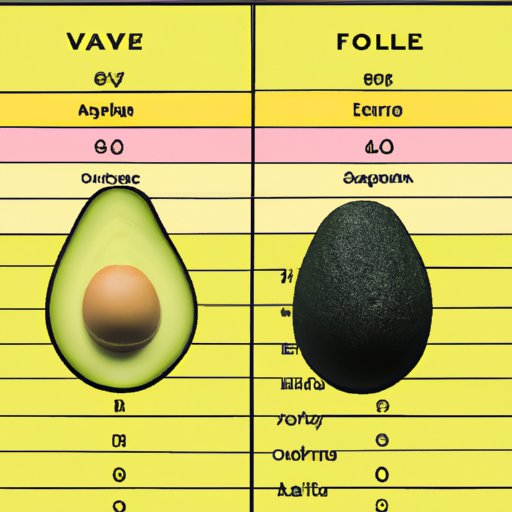Introduction
Avocados have become one of the most popular superfoods in recent years. From avocado toast to guacamole, this creamy green fruit can be found in countless dishes around the world. But what makes avocados so special, and are they really as healthy as people think? In this article, we’ll explore the nutritional value of avocados, their potential health benefits, and any potential risks associated with a high-avocado diet.
Definition of Avocado
Avocados (Persea americana) are a type of berry that grows on trees and is native to Mexico, Central America, and South America. They are a nutrient-dense food, meaning they contain a lot of essential vitamins and minerals in relatively few calories. Avocados are an excellent source of dietary fiber, monounsaturated fatty acids, and antioxidants.

Overview of Popularity and Health Benefits
In recent years, avocados have become increasingly popular both in the culinary world and in the health and wellness space. According to the California Avocado Commission, the average American ate 7.1 pounds of avocados in 2018, up from 4.5 pounds in 2014. Avocados have also been linked to a variety of potential health benefits, including improved heart health, more efficient digestion, and protection against certain types of cancer.

Nutritional Comparison of Avocados vs Other Fruits
Avocados differ from other fruits in terms of their nutrient content. While other fruits are generally high in carbohydrates and low in fat, avocados are higher in fat and lower in carbohydrates than most other fruits. A single medium-sized avocado contains approximately 11 grams of dietary fiber and 23 grams of total fat. By comparison, a single medium apple contains only 4 grams of dietary fiber and 0.3 grams of total fat.

Exploring the Health Benefits of Eating Avocados
Avocados have been linked to a number of potential health benefits. Studies have shown that eating avocados may help improve heart health, protect against certain types of cancer, and improve digestion. Let’s take a closer look at each of these potential benefits.
Heart Health Benefits
Avocados contain high levels of monounsaturated fatty acids, which are known to help reduce bad cholesterol levels and improve overall heart health. According to a study published in The American Journal of Clinical Nutrition, “the consumption of one avocado per day was associated with a significant decrease in LDL cholesterol and triglyceride levels.”
Potential Cancer-fighting Properties
Avocados are a good source of carotenoids, which are compounds that have been linked to a reduced risk of certain types of cancer. One study published in the journal Cancer Research found that carotenoid-rich diets may reduce the risk of developing prostate cancer by up to 24%.
Improved Digestion
Avocados are high in dietary fiber, which is essential for maintaining a healthy digestive system. Dietary fiber helps to keep your bowels regular and can reduce constipation. It also helps to feed the beneficial bacteria in your gut, which play an important role in overall health.
Examining the Pros and Cons of a High-Fat Diet with Avocados
While avocados are high in fat, it’s important to note that not all fats are created equal. Avocados are rich in monounsaturated fats, which are known to be beneficial for your health. Monounsaturated fats can help reduce bad cholesterol levels and improve heart health, making them a much healthier option than saturated or trans fats.
Risks Associated with High-Fat Diets
It’s important to note that while monounsaturated fats are beneficial for your health, a diet that is too high in fat can increase your risk of obesity and other chronic diseases. For this reason, it’s important to limit your intake of all types of fats, including monounsaturated fats, and focus on a balanced diet that includes plenty of fruits, vegetables, and whole grains.
Benefits of Monounsaturated Fats from Avocados
Monounsaturated fats from avocados can be beneficial for your health when consumed in moderation. These fats help to reduce bad cholesterol levels and improve heart health, making them a healthier alternative to other types of fats. Additionally, monounsaturated fats from avocados can help you feel full and satisfied after meals, making them an ideal addition to a balanced diet.
Analyzing the Impact of Avocado Consumption on Blood Sugar Levels
Avocados can also have a positive impact on blood sugar levels. Studies have shown that eating avocados can help improve insulin sensitivity, which is the body’s ability to use insulin effectively. Additionally, avocados contain a compound called lutein, which has been linked to improved glucose metabolism and lower blood sugar levels.
Effects of Avocados on Insulin Sensitivity
A study published in the journal PLOS One found that participants who ate one avocado per day for five weeks saw an average 16% improvement in insulin sensitivity. Additionally, those who consumed two avocados per day saw an average 21% improvement in insulin sensitivity.
Role of Avocados in Controlling Blood Sugar Levels
Avocados can also help control blood sugar levels by providing a slow release of energy throughout the day. This is because avocados are high in dietary fiber, which helps to slow down the absorption of glucose into the bloodstream. As a result, blood sugar levels remain stable and energy levels stay consistent.
Investigating the Effect of Avocados on Weight Loss
Avocados have also been linked to weight loss. Studies have shown that adding avocados to your diet can help you lose weight and maintain a healthy body weight. Let’s take a closer look at the potential benefits of avocados for weight loss.
Potential Benefits of Avocado Consumption for Weight Loss
Avocados are a good source of dietary fiber, which helps to keep you feeling full and satisfied after meals. Additionally, studies have shown that consuming avocados can help reduce appetite and cravings for unhealthy foods. One study published in the journal Appetite found that participants who ate half an avocado with lunch reported a 40% decreased desire to eat for up to three hours after the meal.
Role of Avocados in Regulating Appetite
Avocados contain oleic acid, a monounsaturated fat that has been linked to reduced appetite. Oleic acid is thought to activate hormones in the body that signal to the brain that the body is full. As a result, you are less likely to overeat and more likely to maintain a healthy body weight.
Evaluating the Potential Risks of a High-Avocado Diet
While there are many potential benefits of eating avocados, it’s important to note that there are also some potential risks associated with a high-avocado diet. Let’s take a look at some of the potential risks of eating too many avocados.
Risk of Overconsumption of Calories
Avocados are high in calories, so it’s important to be aware of your portion sizes. Eating too many avocados can lead to weight gain, so it’s important to limit your intake to one or two avocados per day. Additionally, if you are already at a healthy body weight, it’s best to avoid adding extra avocados to your diet.
Potential Interactions with Certain Medications
Avocados are high in vitamin K, which can interfere with certain medications. If you are taking any medications, it’s important to talk to your doctor before making any changes to your diet.
Conclusion
Avocados are a nutrient-dense superfood with a wide range of potential health benefits. Eating avocados can help improve heart health, reduce bad cholesterol levels, and even help with weight loss. However, it’s important to note that a diet that is too high in fat can increase your risk of obesity and other chronic diseases. For this reason, it’s important to incorporate avocados into a balanced diet and limit your intake to one or two avocados per day.
(Note: Is this article not meeting your expectations? Do you have knowledge or insights to share? Unlock new opportunities and expand your reach by joining our authors team. Click Registration to join us and share your expertise with our readers.)
